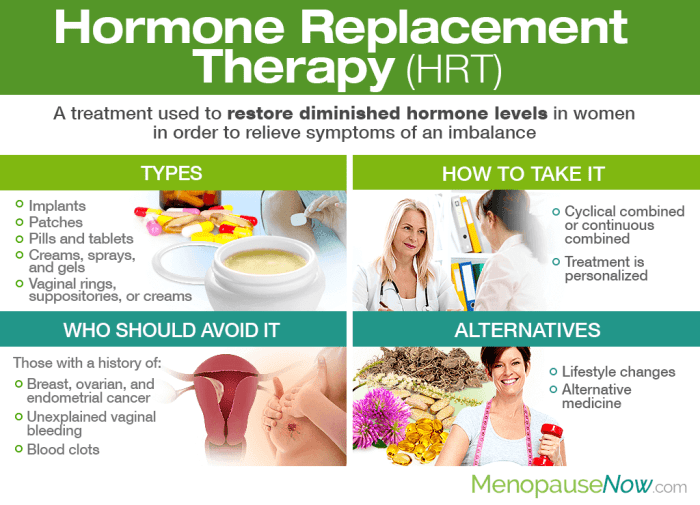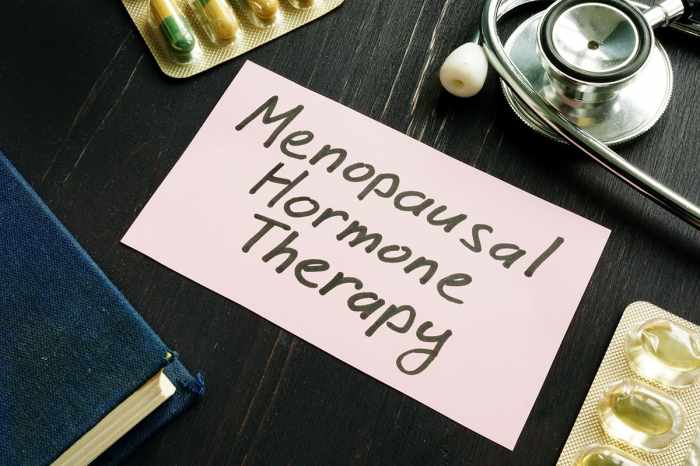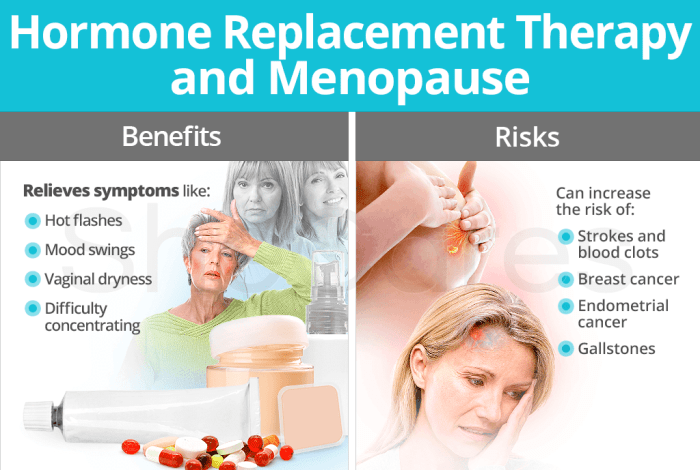Menopausal hormone therapy (MHT) is a treatment option for women experiencing the symptoms of menopause, such as hot flashes, night sweats, and vaginal dryness. MHT involves taking hormones, either estrogen or progestin, to replace the hormones that the body stops producing during menopause.
MHT can be an effective way to relieve menopausal symptoms, but it is important to be aware of the potential risks and benefits before starting treatment. This article will provide an overview of MHT, including the different types of MHT, the potential benefits and risks, and alternative therapies for menopausal symptoms.
Menopausal Hormone Therapy (MHT)

Menopausal hormone therapy (MHT), also known as hormone replacement therapy (HRT), is a treatment option for women experiencing the symptoms of menopause. Menopause is a natural process that occurs when a woman’s ovaries stop producing estrogen and progesterone, leading to a decline in these hormones.
This decline can cause a range of symptoms, including hot flashes, night sweats, vaginal dryness, and mood changes.MHT works by replacing the hormones that are lost during menopause. This can help to reduce or eliminate symptoms and improve a woman’s quality of life.
There are different types of MHT available, including estrogen-only therapy, progestin-only therapy, and combined therapy.
Types of MHT
Estrogen-only therapyis used to treat women who have had a hysterectomy, which is the surgical removal of the uterus. Estrogen can be taken in pill form, as a patch, or as a gel. Progestin-only therapyis used to treat women who have not had a hysterectomy.
Progestin is a synthetic hormone that is similar to progesterone. It can be taken in pill form or as an injection. Combined therapyis a combination of estrogen and progestin. It is used to treat women who have not had a hysterectomy.
Benefits of MHT
MHT can provide a number of benefits for women experiencing the symptoms of menopause, including:
- Reducing hot flashes and night sweats
- Improving sleep
- Preventing osteoporosis
- Reducing the risk of heart disease
- Improving mood
- Increasing energy levels
MHT is not right for everyone. It is important to talk to your doctor about the risks and benefits of MHT before starting treatment.
Risks and Considerations of MHT
Menopausal hormone therapy (MHT) can provide relief from menopausal symptoms, but it is essential to be aware of the potential risks and considerations associated with its use. Understanding these risks and engaging in informed decision-making with your healthcare provider is crucial before starting MHT.
Increased Risk of Breast Cancer
One of the primary concerns associated with MHT is the increased risk of breast cancer. Studies have shown that women who use combined MHT (containing both estrogen and progestin) have a slightly elevated risk of developing breast cancer compared to women who do not use MHT.
The risk is highest in women who use MHT for more than five years.
Blood Clots and Heart Disease
MHT can also increase the risk of blood clots and heart disease, particularly in women over the age of 60. The risk of blood clots is highest in the first year of MHT use, and it decreases over time. The risk of heart disease is also slightly increased with MHT use, especially in women with existing heart disease.
Individualized Risk Assessment
It is important to note that the risks of MHT vary from woman to woman, and individualized risk assessment is essential. Your healthcare provider will consider your age, overall health, family history, and lifestyle factors to determine whether MHT is appropriate for you and to minimize potential risks.
Duration of MHT and Monitoring
MHT is typically recommended for short-term use, usually for up to five years. However, the optimal duration of treatment may vary depending on your individual circumstances. Regular monitoring is also necessary to ensure the continued safety and effectiveness of MHT.
Alternative Therapies for Menopausal Symptoms
Menopausal symptoms can be managed with a range of alternative therapies, including lifestyle modifications, herbal remedies, and acupuncture. These alternatives offer varying degrees of effectiveness and potential benefits compared to menopausal hormone therapy (MHT).
Lifestyle Modifications
Lifestyle modifications can significantly alleviate menopausal symptoms. These include:
Regular exercise
Physical activity helps regulate hormones, improve mood, and reduce stress.
Healthy diet
A balanced diet rich in fruits, vegetables, and whole grains supports overall well-being and may mitigate hot flashes.
Stress management
Techniques like yoga, meditation, or deep breathing can reduce stress and anxiety, which can worsen menopausal symptoms.
Adequate sleep
Getting enough rest helps regulate hormones and improve mood.
Smoking cessation
Smoking worsens hot flashes and other menopausal symptoms.
Herbal Remedies
Certain herbs have been traditionally used to manage menopausal symptoms. However, their effectiveness and safety vary widely.
Black cohosh
Studies suggest black cohosh may reduce hot flashes, but more research is needed.
Red clover
Red clover contains isoflavones, plant compounds that mimic estrogen and may alleviate menopausal symptoms.
Evening primrose oil
This oil contains gamma-linolenic acid, which may reduce breast tenderness and other symptoms.
St. John’s wort
This herb has mood-boosting effects and may help with mood swings and depression.
Acupuncture
Acupuncture involves inserting thin needles into specific points on the body. It has shown promise in reducing hot flashes and other menopausal symptoms.
When to Consider Alternative Therapies vs. MHT, Menopausal hormone therapy
Alternative therapies can be a good option for women who prefer non-hormonal treatments or who experience side effects from MHT. However, they may not be as effective as MHT for severe symptoms.MHT remains the most effective treatment for severe menopausal symptoms, such as hot flashes, night sweats, and vaginal dryness.
It is important to consult with a healthcare provider to determine the best treatment option based on individual needs and preferences.
Current Research and Future Directions: Menopausal Hormone Therapy

Ongoing research on MHT aims to shed light on its long-term effects and explore emerging therapies. Scientists are investigating targeted therapies that selectively address specific symptoms and personalized medicine approaches that tailor treatments to individual needs.
Long-Term Effects of MHT
Studies are evaluating the potential long-term benefits and risks of MHT, particularly regarding cardiovascular health, breast cancer, and cognitive function. Research aims to determine the optimal duration and dosage of MHT to maximize benefits while minimizing risks.
Emerging Therapies
Novel therapies are being explored to address menopausal symptoms without the use of traditional hormone replacement. These include selective estrogen receptor modulators (SERMs), non-hormonal vaginal treatments, and herbal remedies.
Personalized Medicine
Personalized medicine approaches in MHT involve tailoring treatments based on individual factors such as genetic makeup, symptom profile, and medical history. This approach aims to optimize effectiveness and minimize side effects.
Future Directions
Future research in MHT will focus on developing more effective and personalized therapies, evaluating the long-term impact of MHT on women’s health, and exploring alternative approaches to managing menopausal symptoms.
Conclusive Thoughts

MHT is a complex treatment option with both potential benefits and risks. Women considering MHT should discuss the risks and benefits with their doctor to make an informed decision about whether or not MHT is right for them.
Quick FAQs
What are the different types of MHT?
There are three main types of MHT: estrogen-only therapy, progestin-only therapy, and combined therapy.
What are the benefits of MHT?
MHT can relieve menopausal symptoms such as hot flashes, night sweats, and vaginal dryness. It can also help to prevent osteoporosis and reduce the risk of heart disease.
What are the risks of MHT?
MHT can increase the risk of breast cancer, blood clots, and heart disease. The risks of MHT vary depending on the type of MHT, the dose, and the length of time that it is taken.